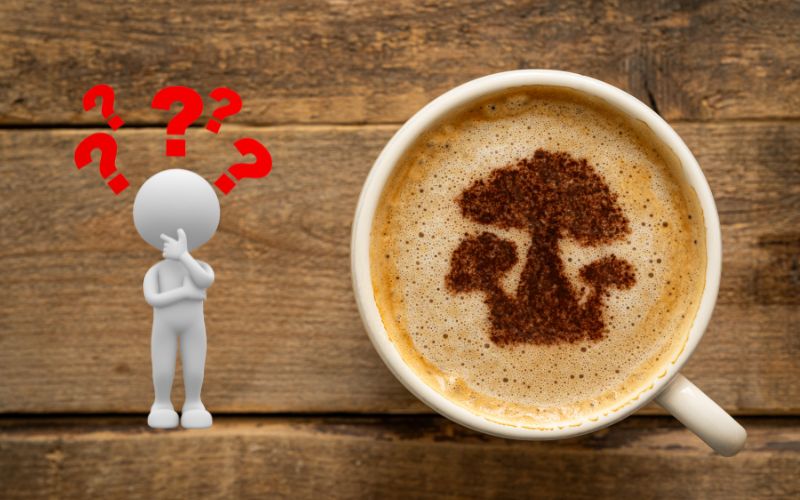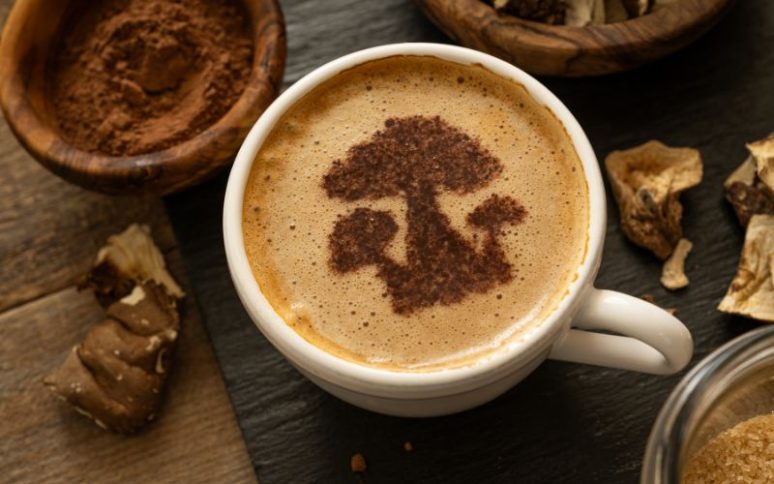Can Mushroom Replace Coffee?

Disclosure: This post may contain affiliate links. As an Amazon Associate, we earn from qualifying purchases.
Introduction: The Question at Hand
Welcome to our comprehensive guide on the intriguing topic of mushroom coffee. If you’re an avid coffee enthusiast or someone who values a boost of energy and mental clarity, you’ve likely stumbled upon the concept of mushroom coffee.
What Does Replacing Coffee with Mushrooms Mean?

Replacing coffee with mushrooms is a concept that may initially sound unconventional. However, the idea behind mushroom coffee is not to entirely replace the well-loved beverage, but rather to offer a unique alternative that provides a different set of benefits. While traditional coffee is cherished for its robust flavor and caffeine kick, mushroom coffee presents an intriguing combination of coffee and mushroom extracts, promising an array of health and wellness advantages.
When considering the concept of replacing coffee with mushrooms, it’s important to delve into the history and cultural significance of both beverages. Coffee has been an integral part of numerous cultures for centuries, valued for its stimulating and social properties. On the other hand, mushrooms have held a revered position in traditional medicine and culinary practices, with a rich history of use as natural remedies and flavor enhancers.
Exploring the idea of mushroom coffee as a replacement for traditional coffee also leads to a discussion of ecological and sustainability considerations. The cultivation of mushrooms generally requires fewer resources and has a smaller ecological footprint compared to the large-scale production of coffee. This raises questions about the environmental impact of each beverage and the potential benefits of a shift toward a more sustainable alternative.
Moreover, the notion of replacing coffee with mushrooms goes beyond just the physical aspects of the beverages; it delves into the realm of holistic health and wellness. Mushrooms are renowned for their diverse array of bioactive compounds, offering potential health benefits such as immune support, antioxidant properties, and cognitive enhancement. These additional benefits, when combined with the familiar sensations of coffee, create an interesting potential for a beverage that not only satisfies the palate but also contributes to overall well-being.
Can Mushroom Coffee Replace Coffee?
For many coffee lovers and health enthusiasts, the question of whether mushroom coffee can truly stand in for the beloved morning brew is a topic of great intrigue. Let’s dive deeper into the comparison between mushroom coffee and traditional coffee to uncover the potential for mushroom coffee as a viable replacement.
- Mushroom coffee offers a unique combination of earthy flavors and potential health benefits, making it an appealing alternative to traditional coffee.
- The addition of medicinal mushrooms, such as chaga and lion’s mane, introduces adaptogenic properties that contribute to overall well-being.
- Research suggests that mushroom coffee may provide sustained energy and mental clarity without the jitters or crashes associated with regular coffee consumption.
There are numerous misconceptions surrounding mushroom coffee, from its taste profile to its efficacy as a coffee substitute. It’s essential to unravel these myths and present the facts to guide coffee enthusiasts and health-conscious individuals in making informed decisions.
- Mushroom coffee can be seamlessly integrated into various recipes, offering a new dimension of flavor and potential health benefits to dishes and beverages.
- Its adaptogenic properties make it an ideal addition to morning routines, providing a holistic approach to a balanced and energized start to the day.
Nutritional Comparison: Mushrooms vs Coffee
Examining the nutritional profiles of mushrooms and coffee paints a fascinating picture of the diverse benefits they offer to the body. While coffee provides an immediate energy boost and mental stimulation through caffeine, mushrooms bring a wealth of nutrients and potential health-boosting properties to the table. Let’s take a closer look at the nutritional aspects of mushrooms and coffee to better understand their distinctive impacts on the body and mind.
- Macronutrient Content: Coffee is virtually calorie-free and contains a small amount of protein, whereas mushrooms are low in calories and high in protein, making them a valuable source of this macronutrient.
- Micronutrient Content: Mushrooms are rich in essential vitamins and minerals such as vitamin D, B vitamins, selenium, and potassium, which coffee lacks. On the other hand, coffee is a significant source of antioxidants, particularly chlorogenic acid, which has potential health benefits.
- Health Impacts: While excessive coffee consumption may lead to jitteriness, insomnia, and increased heart rate, moderate coffee intake has been linked to reduced risk of certain diseases such as Parkinson’s disease and type 2 diabetes. On the other hand, mushrooms have been associated with immune-boosting and anti-inflammatory properties, contributing to overall health and well-being.
Limitations of Mushroom Coffee as a Replacement
When evaluating the limitations of mushroom coffee as a potential replacement for traditional coffee, it’s important to consider the underlying factors that contribute to its unique characteristics. While mushroom coffee has gained attention for its health benefits and potential as an alternative to traditional coffee, it also presents challenges that may affect its widespread adoption as a complete replacement.
One of the primary limitations of mushroom coffee is the taste and flavor profile. Traditional coffee is revered for its distinct and robust flavor, which is deeply embedded in the daily routines and preferences of coffee enthusiasts. In contrast, the earthy and slightly bitter taste of mushroom coffee may not immediately resonate with individuals accustomed to the rich flavor of traditional coffee. This stark difference in taste poses a significant obstacle for those considering a complete transition to mushroom coffee.
Furthermore, the availability and familiarity of mushroom coffee compared to traditional coffee can be a limiting factor. Traditional coffee is widely accessible and ingrained in numerous cultures, making it a staple beverage for millions around the world. On the other hand, mushroom coffee is still considered a niche product in many regions, and its limited availability may hinder its feasibility as a universal replacement for traditional coffee.
Another crucial aspect to consider is the caffeine content in mushroom coffee versus traditional coffee. While some individuals may be drawn to the reduced caffeine content in mushroom coffee, others rely on the stimulating effect of caffeine found in traditional coffee. This disparity in caffeine levels serves as a significant limitation for individuals seeking a seamless transition from traditional coffee to mushroom coffee.
Moreover, the ritualistic and social aspects associated with traditional coffee consumption present inherent limitations for mushroom coffee as a substitute. Coffee has been ingrained in social gatherings, work environments, and daily routines, creating a deeply rooted cultural significance. Mushroom coffee, despite its potential health benefits, may struggle to fully replace traditional coffee in these social and cultural contexts, posing a considerable challenge for widespread adoption as a complete replacement.
Conclusion: Is Mushroom Coffee a True Replacement?
After exploring the pros and cons of mushroom coffee as a replacement for traditional coffee, it becomes apparent that while mushroom coffee offers some unique benefits, it may not be a complete substitute for coffee for everyone.
Here are some key points to consider:
- Mushroom coffee provides a more stable energy boost without the jitters or crash often associated with regular coffee.
- It contains a variety of health-promoting compounds, including antioxidants and adaptogens.
- However, the flavor profile of mushroom coffee may not appeal to everyone, and some individuals may prefer the taste of traditional coffee.
- While mushroom coffee offers nutritional benefits, it may not provide the same sensory experience and ritualistic enjoyment that many coffee enthusiasts seek.
- Ultimately, the decision to replace coffee with mushroom coffee depends on individual preference, lifestyle, and health goals.
